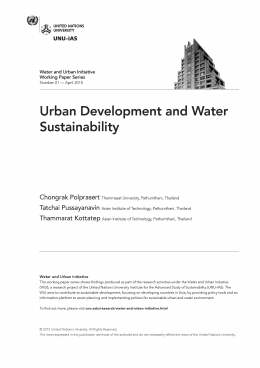Urban Development and Water Sustainability
Year:
2015
Publisher:
United Nations University
Due to limited access to safe drinking water and lack of adequate sanitation facilities in most developing counties, the rapid population growth and urbanization have caused serious water scarcity and water pollution problems. Another prevalent environmental problem is global warming caused by burning of fossil fuels which has negative impacts on the hydrological cycle and consequently unfavorable changes in water quality. The threats posed by global warming are an additional stressor to the environmental system and water sustainability. An ecological wastewater treatment management such as the “closed-loop systems” should be considered. The closed-loop concept, using wastewater cycles from “point-of-generation” to “point-of-production”, could provide a better way for attaining high environmental quality and full utilization of wastewater resource. Subsequently, some innovative sanitation technologies recently developed such as solar septic tanks and hydrothermal carbonization for feacal sludge have been found to meet the closed-loop concept because they were able to inactivate the pathogens, remove the pollutants and producing valuable by-products such as biogas and hydrochar, respectively. These cost-effective technologies should be able to protect the public health, improve quality of the canals and rivers in the urban areas, all contributing to water sustainability.
Work regions:
Publication Type:
Publication language:
English

Files:
